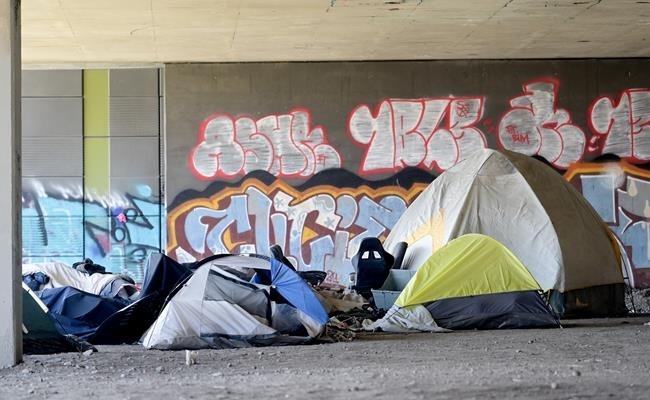MONTREAL — The number of people living in emergency shelters or on the streets surged in all regions of Quebec over the last four years but rose most sharply outside Montreal, a new report says.
Commissioned by the province's Health Department, the report found that "visible" homelessness in Quebec increased by about 44 per cent between April 2018 and October 2022, and by 33 per cent in Montreal.Â
The analysis by the province's public health institute says Quebec is witnessing a "regionalization of street homelessness," as the number of people living outside has become increasingly significant in regions such as Mauricie—Centre-du-Québec, Estrie and the Outaouais.
The survey was carried out on Oct. 11, 2022, and counted 10,000 homeless people across the province, including 4,690 in Montreal. While Montreal had by far the highest number of people living in shelters or on the streets, its percentage of the total number of homeless people in Quebec living outside declined from 80 per cent in April 2018 to about 60 per cent.
The Outaouais region, in western Quebec, saw the biggest increase over the four-and-a-half-year period, with an estimated increase of 389 people, or 268 per cent. The next largest increases were in the Laurentians region, located north of Montreal, and the Montérégie region, to the city's south.Â
In response to the report, the province's junior health minister announced an extra $15.5 million for projects to fight homelessness, in addition to the $4.5 million included in this fiscal year's budget.
"We saw the numbers, they're worrying," Lionel Carmant said Thursday. "However, we were expecting it a little."
Premier François Legault said Thursday that he was worried by the report, and suggested that more help could be announced in November's economic update. "We'll have to do more," he said.Â
Visible homelessness is defined in the report as the number of people without permanent homes who are living on the street or in places such as cars, sheds and emergency shelters. The researchers noted that their report doesn't capture the true number of people without homes, or the larger number of "hidden homeless" who are temporarily living with someone else or at a hotel.
"The estimated number of people experiencing homelessness, in the scope of this exercise, only concerns the night of Oct. 11, 2022," the report says. "It is lower than the total number of people who experience an episode of homelessness over the course of a year."
The public health institute — Institut national de santé publique du Québec — deployed social workers and volunteers to look for people sleeping outside, while it carried out surveys in shelters and detention centres. Â
It found that certain groups are over-represented in the visible homeless population: Indigenous people, LGBTQ people, those who grew up in the child protection system, people who had been incarcerated and those who had been evicted.Â
The report suggested that the lack of affordable housing was a major reason for the increase since 2018. COVID-19 was another factor, the report said, adding that 15 per cent pointed to the pandemic as a reason they had become homeless.
On Thursday, Quebec's opposition parties said the provincial government has not done enough to fight homelessness in recent years.Â
Carmant and the rest of the cabinet have also faced criticism from mayors, who have said that government hasn't given them the resources needed to tackle the growing problem.
The mayors will get a chance to push the issue on Friday at a summit on homelessness hosted by the Union des Municipalités du Québec, which represents the province's cities.
This report by The Canadian Press was first published Sept. 14, 2023.
— By Morgan Lowrie in Montreal and Thomas Laberge in Quebec City.
The Canadian Press



